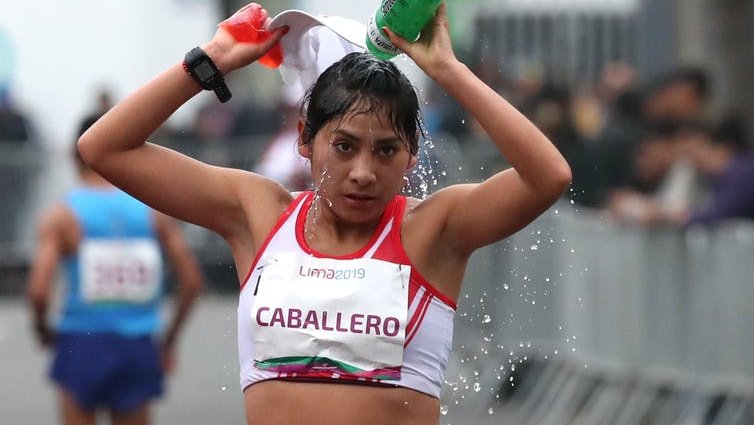If all goes to plan, athletes will compete in hot conditions at the rescheduled 2021 Tokyo Summer Olympics. Indeed, summers in Japan can be quite intense – with hot and humid weather and temperatures reaching up to 35°C.
But our recent research indicates that taking the oral contraceptive pill may help women in sport to better cope with this kind of heat. There is limited research about the consequences of extreme heat on the health and wellbeing of female athletes. But we know that women are at a higher risk of succumbing to heat-related illness and can reach hyperthermic levels – with an abnormally high body temperature – in a shorter period of time.
The majority of research on how female athletes should train for the heat is based on what works for men, and this comes with obvious problems. Not only are men and women built differently, but women also have a monthly cycle of hormones – and this has a powerful effect on the body.
Menstruation can cause muscle aches, joint pains and tender breasts. Then there’s the headaches, cramps, bloating, diarrhoea and constipation. So it stands to reason then that periods may have a detrimental impact on a woman’s sports performance.
There’s also the fact that, just before and during a period, many women experience an increase in body temperature, making them hotter and sweatier than usual. So when it comes to training for hot conditions, female athletes certainly have their work cut out.
Handling the heat
It’s well established that repeatedly exposing a person to high temperatures results in adaptations to the body, such as lower body temperature and heart rate during exercise. But almost all research in this area has exclusively used male participants.
A previous study has shown how the use of the oral contraceptive pill can help to control female hormones and maintain women’s body temperatures in temperate conditions. So we wanted to find out if the oral contraceptive pill could help to control body temperature in women in hot conditions. Our study looked at how young females who do physical activity a minimum of three times a week respond to and adapt to hot conditions when taking the oral contraceptive pill.
REUTERS/Ivan Alvarado
We used a short-term heat acclimation regime that has previously been successful with male participants. This involved using a state-of-art environmental chamber as part of a short-term (five-day) heat acclimation programme, which saw participants undertaking intermittent exercise in hot environments.
The participants underwent 90 minutes of heat exposure with no fluid intake for five consecutive days at 39.5℃ (60% humidity). Each acclimatisation session involved a roughly 30-minute cycling exercise, controlled by maintaining core body temperature at 38.5℃, measured using a rectal probe.
And we found that, by using oral contraceptive pills, the women in our study were able to adapt as effectively – and to the same magnitude – as male participants of a similar level of physical conditioning.
This may mean that female athletes who take the contraceptive pill are more likely to acclimatise better and quicker in hot conditions compared with female athletes who don’t take the pill. This is because taking the pill helps to control body temperature during the menstrual cycle.
That said, women who are less fit and don’t partake in regular exercise may not respond so effectively. This is because they are likely to have a lower aerobic capacity, less efficient sweat response and increased insulation due to higher amounts of body fat.
Healthy hormonal balance
There are of course, many elite competitors who will not want to use the oral contraceptive pill. So a “one size fits all” approach cannot be taken when female athletes are preparing for hot conditions. But our research may well have implications for the heat acclimation procedures used for female competitors preparing for future events.
Ultimately though, our findings show how tracking a woman’s menstrual cycle can be an important part of training and competition preparation, a strategy that has already been adopted by the US women’s football team. Of course, to women, this may sound like an obvious conclusion. But given that the sporting world is still largely dominated by men, perhaps it’s not surprising the research is still playing catch-up.
![]()
Andrew Garrett received funding from the João Havelange Research Scholarship, FIFA..











